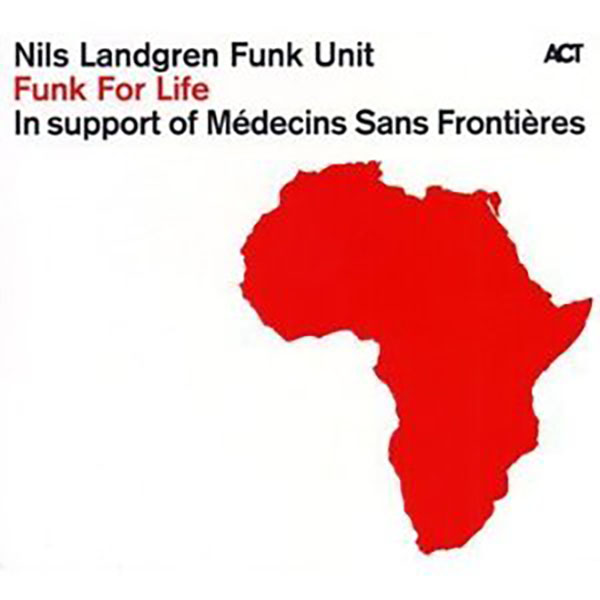
by Ian Mann
February 24, 2010
/ ALBUM
Another example of Landgren's trademark mix of funk and soul, this time in support of a very worthy cause.
I found the Funk Unit’s 2008 release “Licence To Funk” rather unconvincing but I’m pleased to say that this latest offering is something of an improvement and the fact that the album supports a very worthy cause comes as a very welcome bonus.
One Euro from the sale of each copy of this new CD will be donated to Medecins Sans Frontiers to support their work in Kibera, Nairobi, one of Africa’s largest and most notorious slums. The idea for the album came when Landgren received a letter from his godson, a doctor with MSF. Landgren, already a supporter of MSF Sweden, decided to visit Africa to view the work of MSF and to play with and for the people of Kibera. Landgren and his band worked in Kibera unpaid and their trip was financially supported by Yamaha Sweden who also donated musical instruments to Kibera’s schools. Siggi Loch at ACT also gave financial assistance by paying the anticipated donation amount to MSF up front. The famous photographer Mattias Klum documented the visit and supplied the photographic image on the inside of the CD cover.
The album was recorded in various European studios following the band’s return from Kibera. Joining trombonist/vocalist Landgren on this recording are Magnum Coltrane Price (bass, vocals), Magnus Lindgren (woodwinds,backing vocals), Jonas Wall (woodwinds,backing vocals), Sebastian Studnitzky (keyboards, trumpet, backing vocals), Andy Pfeiler (guitar, vocals) and Robert Mehmet Ikiz (drums, backing vocals). Some tracks feature two drummers with the addition of Wolfgang Haffner.
The album’s twelve selection are credited to the band as a whole and largely feature the Unit’s trademark funk/soul sound. However the brief opener “Kibera Sunrise” is an atmospheric aural picture of the African day break delicately sketched by the Unit’s horns.
It’s soon business as usual with “Funk For Life” a groove driven mission statement of the album’s charitable aims with some of Kibera’s young residents joining in on the final chorus.
The title of “Mag Runs The Voodoo Down” is Price’s nod to Miles Davis’ experiments in the funk genre. It’s a hard grooving piece featuring Price’s soulful , occasionally treated vocals and some fiery playing from the group as a whole.
“Suguta Road” by contrast is a richly atmospheric instrumental that skilfully blends the voices of the horns with Landgren’s trombone and the flutes of Lindgren and Wall particularly prominent. Underpinning it is a subtle but unmistakably funky groove.
“Finish What You Started” is another funk/soul workout with punchy vocals and a low down and dirty groove. “Danger Zone” covers broadly similar territory albeit in a sweeter, more soul orientated manner with flutes again prominent in the arrangement.
“Matudu” is an instrumental funk juggernaut with a filthy groove and acts as a vehicle for the leader’s wah wah trombone. “Dry”, another instrumental offers a sweeter alternative with some tasty saxophone although the album credits don’t make it clear exactly who is responsible.
“Kibera” employs a shuffling funk beat, fat juicy horns, trilling Rhodes and minimalistic lyrics. It’s great fun. So is the harder hitting “The Brown Blues” a relentless seven plus minutes of bruising funk that frames solos from Studnitzky’s keyboards, the leader’s trombone and one of the saxophonists. The bulk of the album was recorded at the Hansa Studios in Berlin during the same week that the band were playing a residency at the city’s A-Trane Club. It may have been a demanding schedule but the nights on the bandstand certainly sharpened the band’s chops for the studio sessions with the result that much of “Funk For Life"exhibits a greater sense of joy and urgency than it’s immediate predecessor.
“Never Judge” is effectively the album’s ballad. “Never judge a book by it’s cover” is the message but the tune does hang around for rather too long after making it’s point.
Finally comes the lilting instrumental grooves of “Kenya Kane” with it’s pithy solos for trombone, saxophone and guitar and a strong all round group performance in which Studnitzky’s colourful organ fills are particularly striking. It’s a good way to end an enjoyable and unpretentious album.
“Funk For Life” offers little in the way of musical surprises. Funk Unit’s M.O. Is pretty much set in stone by now but it is a sharper offering than their previous release and the playing is characteristically polished and funky. It’s still all a bit too smooth for me but it is in a very worthy cause. More power to Mr. Redbone’s sliding elbow.
blog comments powered by Disqus